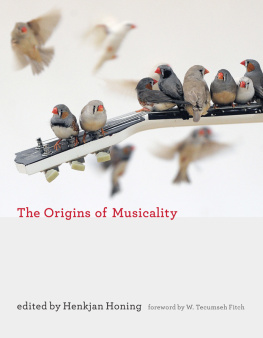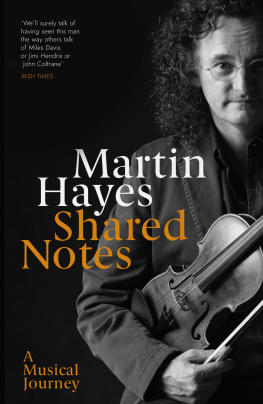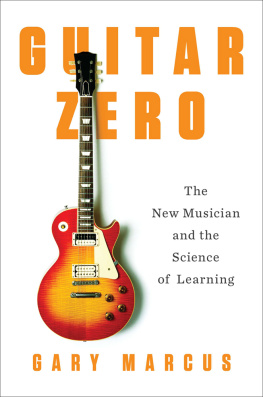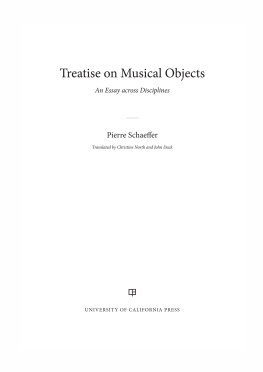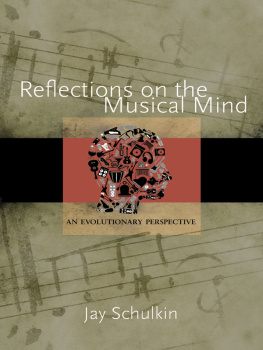I am very grateful to the Netherlands Institute for Advanced Study in the Humanities and Social Sciences (NIAS) in Wassenaar and the Lorentz Center in Leiden, which gave me the opportunity to spend an entire academic year reading about the relationship between music, musicality, and biology; to reflect on it; and subsequently to organize an international workshop on the subject. Although the year passed faster than I would have liked, owing to a bicycle accident and its aftermath, it provided me with the mental space to envisage a first, provisional bridge between music cognition and biology, and to describe the initial exploratory research steps in what would later become the fabric of this book.
Many people supported me during the writing process. I am indebted to Pieter de Bruijn Kops, Henk ter Borg, Carel ten Cate, Tijs Goldschmidt, Pim Levelt, Alice ter Meulen, and Anne-Marie Vervelde for their valuable advice. Special thanks go to Bob Prior and Anne-Marie Bono at the MIT Press for their enthusiasm and support, Sherry Macdonald for the beautiful translation, and the Dutch Foundation for Literature for making the translation possible. I also thank Peter van Gorsel, Petry Kievit, Ren van Veen, and many others who commented on the Dutch manuscript (or parts of it) at different stages. My thanks go as well to Merwin Olthof, Carola Werner, Iza Korsmit, and Jeannette van Ditzhuijzen for their help in the planning of teaching and research activities, and other logistical matters while I was writing this book. In the period before and after my stay in Wassenaar, tables at the cafs Captein & Co., Mads, and Spanjer & Van Twist in Amsterdam often afforded me precious writing opportunities. Finally, I would like to sincerely thank my research group, a diverse assemblage of distinct young minds with various talents and ambitions. Time after time they showed me that, as well as creating considerable confusion and uncertainty, interdisciplinarity can generate valuable and much-needed insights and solutions.
Afterword
Amsterdam, October 10, 2013. A woman in a white coat bends over me and asks if I know where I am and what day it is. I have no idea. I look around me and glimpse beds on high legs in a sun-drenched room and computer screens hanging upside down from the ceiling but far too high up. Strange. Is this a hospital? A short time later someone else comes and asks me exactly the same questions. Why the persistence? Why the questions? And the day? Well, I had resolved to remember that.
I look at the clock. Suddenly it is midnight. I am lying in a dimly lit roomin a hospital, that much I know by now. A handwritten note lies on the bedside table next to me. It contains answers to my questions, which I had repeatedly asked in the same order. How do they know that? I start to become agitated and, above all, suspicious. I set the note aside and immediately forget what it says. When the dizziness passes, I pick it up again and am surprised to read, for a second time, the same answers to the same questions. How could this be? Something must be terribly wrong.
It is Tuesday. It seems I was knocked off my bicycle and landed on my head. At least that is what the note says. I had been heading to one of my regular local cafs to write and have a bite to eat. A severe concussion and something broken or bruised in my back, they say. Now I begin to worry. Might my head have been injured? As for my back, that much is clear, because I feel a sharp pain there. That will pass. But my head?
Occasionally, someone comes and shines a flashlight in my eyes and asks the now-familiar questions: Where am I? What day is it? I practice the answers because it seems important, but they evaporate again instantly. Earlier in the day my girlfriend, tiring of my endlessly repeated questions, had written them down on a piece of paper with the telling heading FAQs, and laid it on the bedside table.
I had just received a generous grant that would allow me to spend a year at the Netherlands Institute for Advanced Study in the Humanities and Social Sciences (NIAS) in Wassenaar and work full-time on this book and a number of other projects, including organizing an international workshop on musicality to be held at the Lorentz Center for the Sciences in Leiden. This would not be happening now, at least not as I had imagined it. During the first few weeks in Wassenaar, it took an enormous effort for me to walk even the shortest distance in the nearby dunes. Someone always had to accompany me because I lost my way after just one or two bends in the path. I sleep endlessly and worry mostly about whether my head will ever recover.
Wassenaar, December 3, 2013. I leaf through my notes from the past few weeks and keep coming across the same ideas formulated almost identically. Am I forgetting more than I realize?
Suspiciously, I reread several texts. Some passages appear to have been written by someone else. Access to my own memory has clearly changed. A week ago, my neurologist had assured me that this was normal. All kinds of things could be tested but my brain was obviously still recovering. A test would only be a snapshot, he had commented strategically. Recovering? It had already been two months since the accident. What if my memory doesnt improve?
My unease is fueled by the fact that I have twice had to postpone a lecture series for the Universiteit van Nederland (a platform where leading Dutch scientists give free lectures on the internet). Though I am still rehearsing my text, today as well, I keep forgetting what comes next in the narrative. I have no overview. I can concentrate on the details but am hopeless with the broader picture. This suddenly reminds me of zebra finches. Is this what it feels like to be a zebra finch?
After walking around my room in circles for the umpteenth time, practicing the lecture and finally acknowledging that things arent going much better than yesterday, I give up and decide to cancel all my speaking engagements for the coming months. I feel relieved and sad at the same time.
Wassenaar, February 4, 2014. In about five weeks time, twenty-three researchers from around the world will be coming to Leiden for the Lorentz workshop to talk about musicality for a week. At the moment, I cannot imagine I will be able to participate at their level. It is taking me forever to plan the workshop, to think through all the details one by onethe program, the working sessions, the research questions. But the workshop must go ahead, if necessary, without me.
Today Carel ten Cate is coming to talk through the program again and check that I havent overlooked anything. We draw up a strict regimen for the rapporteurs. They will record all the afternoon sessions, then report back to the others at the end of the day on what was discussed and proposed during the working sessions. Two students will also take notes on each of the other activities so that I dont have to worry about my shaky memory. The plan is to draw up a research agenda for the coming years by the end of the conference.
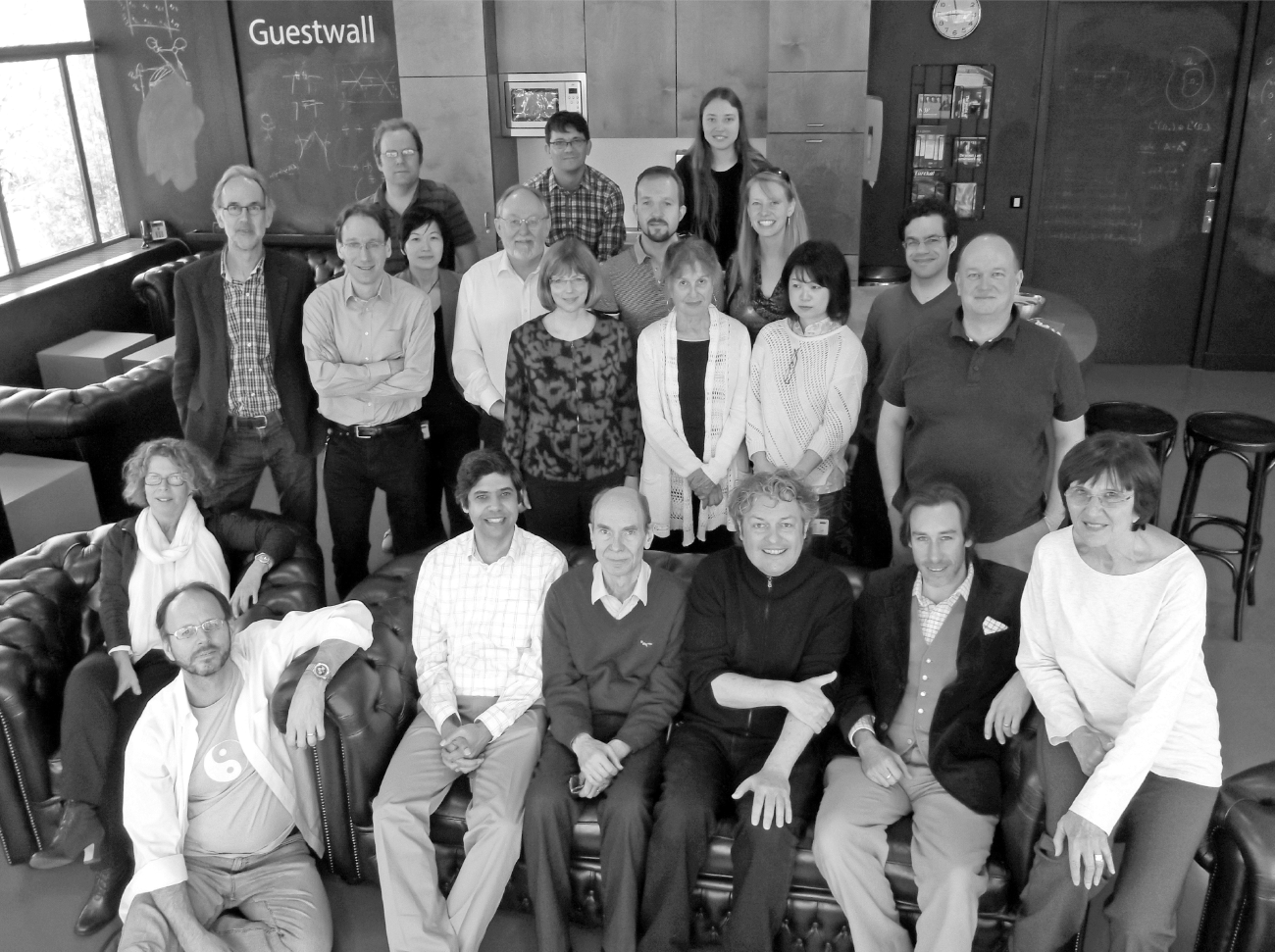
Figure 11.1
Participants at the Lorentz workshop. Front row (seated, from left to right): Isabelle Peretz, W. Tecumseh Fitch, Ani Patel, Bjrn Merker, Henkjan Honing, Iain Morley, and Sandra E. Trehub; behind (standing, from left to right): Carel ten Cate, Simon E. Fisher, Willem Zuidema, Yukiko Kikuchi, David Huron (white shirt), Hugo Merchant (checked shirt), Laurel J. Trainor, Martin Rohrmeier, Judith Becker (white cardigan), Marisa Hoeschele, Jessica Grahn, Yuko Hattori (white blouse), Bruno Gingras, and Geraint Wiggins.
In the end, the workshop went much better than I dared to hope. From the first day already, the atmosphere within the group of researchers was highly constructive, partly due to the careful selection of participants. I had discussed the selection thoroughly with Sandra Trehub, Isabelle Peretz, and Carel ten Cate. It wasnt only about bringing together the most interesting researchers and their complementary areas of expertise, preferably with the right balance of junior/senior and male/female. An even more important criterion was to assemble participants who were prepared to think freely and share their thoughts openly in an interdisciplinary context. The result was that none of the intransigent positions I have often experienced at expert workshops emerged. In particular, the motivation to focus on what we didnt know, rather than on trying to convince colleagues about our own research and insights, resulted in a highly productive week. The theme of the first morning was the evolutionary origins of musicality.


